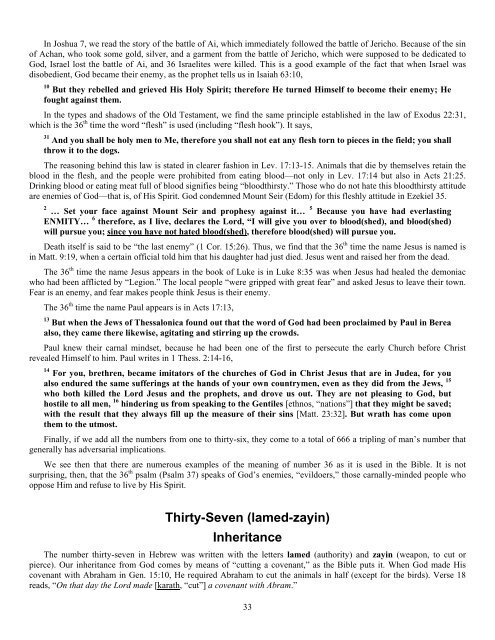Create successful ePaper yourself
Turn your PDF publications into a flip-book with our unique Google optimized e-Paper software.
In Joshua 7, we read the story of the battle of Ai, which immediately followed the battle of Jericho. Because of the sin<br />
of Achan, who took some gold, silver, and a garment from the battle of Jericho, which were supposed to be dedicated to<br />
God, Israel lost the battle of Ai, and 36 Israelites were killed. This is a good example of the fact that when Israel was<br />
disobedient, God became their enemy, as the prophet tells us in Isaiah 63:10,<br />
10 But they rebelled and grieved His Holy Spirit; therefore He turned Himself to become their enemy; He<br />
fought against them.<br />
In the types and shadows of the Old Testament, we find the same principle established in the law of Exodus 22:31,<br />
which is the 36 th time the word “flesh” is used (including “flesh hook”). It says,<br />
31 And you shall be holy men to Me, therefore you shall not eat any flesh torn to pieces in the field; you shall<br />
throw it to the dogs.<br />
The reasoning behind this law is stated in clearer fashion in Lev. 17:13-15. Animals that die by themselves retain the<br />
blood in the flesh, and the people were prohibited from eating blood—not only in Lev. 17:14 but also in Acts 21:25.<br />
Drinking blood or eating meat full of blood signifies being “bloodthirsty.” Those who do not hate this bloodthirsty attitude<br />
are enemies of God—that is, of His Spirit. God condemned Mount Seir (Edom) for this fleshly attitude in Ezekiel 35.<br />
2 … Set your face against Mount Seir and prophesy against it… 5 Because you have had everlasting<br />
ENMITY… 6 therefore, as I live, declares the Lord, “I will give you over to blood(shed), and blood(shed)<br />
will pursue you; since you have not hated blood(shed), therefore blood(shed) will pursue you.<br />
Death itself is said to be “the last enemy” (1 Cor. 15:26). Thus, we find that the 36 th time the name Jesus is named is<br />
in Matt. 9:19, when a certain official told him that his daughter had just died. Jesus went and raised her from the dead.<br />
The 36 th time the name Jesus appears in the book of Luke is in Luke 8:35 was when Jesus had healed the demoniac<br />
who had been afflicted by “Legion.” The local people “were gripped with great fear” and asked Jesus to leave their town.<br />
Fear is an enemy, and fear makes people think Jesus is their enemy.<br />
The 36 th time the name Paul appears is in Acts 17:13,<br />
13 But when the Jews of Thessalonica found out that the word of God had been proclaimed by Paul in Berea<br />
also, they came there likewise, agitating and stirring up the crowds.<br />
Paul knew their carnal mindset, because he had been one of the first to persecute the early Church before Christ<br />
revealed Himself to him. Paul writes in 1 Thess. 2:14-16,<br />
14 For you, brethren, became imitators of the churches of God in Christ Jesus that are in Judea, for you<br />
also endured the same sufferings at the hands of your own countrymen, even as they did from the Jews, 15<br />
who both killed the Lord Jesus and the prophets, and drove us out. They are not pleasing to God, but<br />
hostile to all men, 16 hindering us from speaking to the Gentiles [ethnos, “nations”] that they might be saved;<br />
with the result that they always fill up the measure of their sins [Matt. 23:32]. But wrath has come upon<br />
them to the utmost.<br />
Finally, if we add all the numbers from one to thirty-six, they come to a total of 666 a tripling of man’s number that<br />
generally has adversarial implications.<br />
We see then that there are numerous examples of the meaning of number 36 as it is used in the Bible. It is not<br />
surprising, then, that the 36 th psalm (Psalm 37) speaks of God’s enemies, “evildoers,” those carnally-minded people who<br />
oppose Him and refuse to live by His Spirit.<br />
Thirty-Seven (lamed-zayin)<br />
Inheritance<br />
The number thirty-seven in Hebrew was written with the letters lamed (authority) and zayin (weapon, to cut or<br />
pierce). Our inheritance from God comes by means of “cutting a covenant,” as the Bible puts it. When God made His<br />
covenant with Abraham in Gen. 15:10, He required Abraham to cut the animals in half (except for the birds). Verse 18<br />
reads, “On that day the Lord made [karath, “cut”] a covenant with Abram.”<br />
33

















